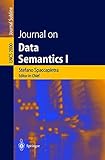Journal on Data Semantics I [electronic resource] /
Material type: TextSeries: Journal on Data Semantics ; 2800Publisher: Berlin, Heidelberg : Springer Berlin Heidelberg : Imprint: Springer, 2003Edition: 1st ed. 2003Description: XVI, 240 p. online resourceContent type:
TextSeries: Journal on Data Semantics ; 2800Publisher: Berlin, Heidelberg : Springer Berlin Heidelberg : Imprint: Springer, 2003Edition: 1st ed. 2003Description: XVI, 240 p. online resourceContent type: - text
- computer
- online resource
- 9783540397335
- Data structures (Computer science)
- Information theory
- Database management
- Computer networks
- Information storage and retrieval systems
- Application software
- Artificial intelligence
- Data Structures and Information Theory
- Database Management
- Computer Communication Networks
- Information Storage and Retrieval
- Computer and Information Systems Applications
- Artificial Intelligence
- 005.73 23
- 003.54 23
- QA76.9.D35
- Q350-390
Formal Reasoning Techniques for Goal Models -- Attribute-Based Semantic Reconciliation of Multiple Data Sources -- Data Quality in Web Information Systems -- Reasoning about Anonymous Resources and Meta Statements on the Semantic Web -- IF-Map: An Ontology-Mapping Method Based on Information-Flow Theory -- OntoEdit: Multifaceted Inferencing for Ontology Engineering -- Distributed Description Logics: Assimilating Information from Peer Sources -- On Using Conceptual Data Modeling for Ontology Engineering -- The DaQuinCIS Broker: Querying Data and Their Quality in Cooperative Information Systems.
This book constitutes the ?rst volume of the ?rst journal in the new LNCS Jo- nalSubline,theJournalonDataSemantics. Publishingajournalinabookseries might come as a surprise to customers, readers, and librarians, thus we would like to provide some background information and our motivation for introducing this new LNCS subline. As a consequence of the very tight interaction between the Lecture Notes in ComputerScienceseriesandtheinternationalcomputerscienceresearchand- velopment community, we receive quite a few proposals for new archive journals. From the successful launch of workshops or conferences and publication of their proceedings in the LNCS series, it might seem like a natural step to approach the publisher about launching a journal once this speci?c ?eld has gained a c- tain level of maturity and stability. Each year we receive about a dozen such proposals and even more informal inquiries. Like other publishers, it has been our experience that launching a new jo- nal and making it a long-term success is a hard job nowadays, due to a generally di?cult market situation, and library budget restrictions in particular. Because many of the proceedings in LNCS, and especially many of the LNCS postp- ceedings, apply the same strict reviewing and selection criteria as established journals, we started discussing with proposers of new journals the alternative of devoting a few volumes in LNCS to their ?eld, instead of going through the painful Sisyphean adventure of establishing a new journal on its own.


There are no comments on this title.